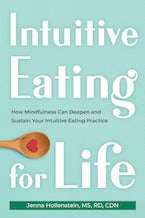By Jenna Hollenstein, MS, RD, CDN, author of Intuitive Eating for Life
Whether or not you realize it, you work with clients struggling with food and body image. Disordered eating (restricting certain foods, regularly monitoring weight, ignoring hunger cues to lose or maintain weight, exercising excessively) and body image disturbances (body dysmorphia, body checking, obsessing over perceived problems, comparing bodies, thinking life would improve if their body were different) have in many ways become the norm in our “diet culture.” And whether food and body are the reasons an individual seeks counseling, these issues will surely find their way into the conversation. Problems with relationships, intimacy, self-worth, and personal growth are all closely tied to how someone feels about their body.
Most clinicians don’t receive much formal education on working with clients with disordered eating. This can remain a therapeutic blind spot unless you intentionally seek out that information. And, given the pace of changes in the science and our collective consciousness, continuing that education will always be important.
Clinicians are vulnerable to the diet culture, too! We are constantly bombarded by the message that it’s healthier, more attractive, and simply better to be in a smaller body. It’s difficult not to soak that up in one way or another. So, to truly help our patients and clients with their deepest struggles, without inadvertently causing harm and deepening the hold of the diet culture, we must assess our own internalized diet mentality.
One resource to orient and anchor you in a saner and scientifically backed approach to the care and feeding of bodies is intuitive eating—a scientifically validated model of peaceful eating developed by registered dietitians, Elyse Resch and Evelyn Tribole. Studies showing the benefits of being an intuitive eater, for example, state that they share the following characteristics:
- They give themselves unconditional permission to eat, i.e., what, when, and how much
- They eat primarily for physical reasons, i.e., in response to hunger cues
- They have ways of coping with emotions that don’t involve food
- They make food choices—what and how much they eat—that feel good in their bodies
These criteria give us a good starting point in assessing our own diet mentality. We can ask ourselves:
- Do I give myself unconditional permission to eat, or are there foods or groups of foods that are off-limits?
- Do I generally eat when I am physically hungry, or do I often find myself eating in the absence of physical cues?
- Do I intentionally or unintentionally ignore hunger signals due to work constraints or an intention to restrict?
- Does food substitute for intimacy, fun, and entertainment, or serve as my primary source of pleasure?
- Do my food choices impact me negatively or positively, both emotionally and physically?
Going even deeper, we can assess the relationship with our bodies at the most basic level:
- Do I believe it is possible to be in a larger body and to be fit and healthy, and to eat well?
- Do I subscribe to the idea that the body can always be improved upon?
- Do I feel gratitude, appreciation, respect, or at least neutrality about my own body?
- Do I strive to change my body in ways that require me to override my body’s natural signals?
- Do I place disproportionate emphasis on appearance both for myself and for others?
This line of inquiry isn’t meant to provoke shame or self-judgment; it is only to reveal what is already there and what can be healed through attention, patience, and mindfulness. Because we are all—clinicians and clients alike—wired for belonging and connection with others, and because the culture tells us that thinness is a means of ensuring that connection and belonging, it is no wonder we are vulnerable to dieting thoughts and behaviors. Assessing our own diet mentality and beginning our own healing journey not only gives us access to deeper levels of ourselves, but empowers us to be even more supportive of our clients.
Jenna Hollenstein, MS, RD, CDN, is a nutrition therapist, meditation teacher, and author of five books. Her work combines intuitive eating, trauma-sensitive mindfulness, polyvagal theory, and other embodied modalities. Her work has been featured in Forbes, The Wall Street Journal, Self, Health, Lion’s Roar, Mindful, Vogue, Elle, Glamour, Women’s World, and U.S. News & World Report. Jenna lives in the greater New York City, NY, area.



 2024 Peace Playbook: 3 Tactics to Avoid Clashes with Your Partner
2024 Peace Playbook: 3 Tactics to Avoid Clashes with Your Partner